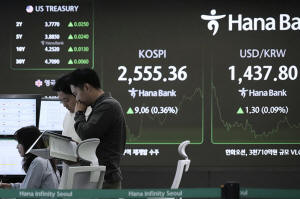Global shares mostly gain as uncertainty over US tariffs persists
[April 28, 2025] By
JIANG JUNZHE
HONG KONG (AP) — Global markets were mostly higher on Monday as
investors watched to see what may come of negotiations over U.S.
President Donald Trump’s tariffs.
The future for the S&P 500 dropped 0.3% while that for the Dow Jones
Industrial Average slid 0.2%.
Germany's DAX added 0.2% to 22,294.34 and the CAC 40 in Paris gained
0.4% to 7,568.75. Britain's FTSE 100 advanced 0.3% to 8436.78.
Shares in China slipped despite more efforts by Beijing to boost the
economy, as the status of talks between Washington and Beijing remained
unclear.
Trump has said he’s actively negotiating with the Chinese government on
tariffs — while the Chinese and U.S. Treasury Secretary Scott Bessent
stated that talks have yet to start.
Hong Kong's Hang Seng was nearly unchanged at 21,971.96, while the
Shanghai Composite Index fell 0.2% to 3,288.41.
Tokyo’s Nikkei 225 picked up 0.4% to 35,839.99 and the Kospi in South
Korea was nearly unchanged at 2,548.86.
Australia's S&P/ASX 200 advanced 0.4%, closing at 7,997.10. Taiwan's
Taiex gained 0.8%
On Friday, Big Tech stocks helped Wall Street close a winning,
roller-coaster week, one that saw markets swing from fear to relief and
back to caution because of Trump’s trade war.
The S&P 500 rose 0.7%, capping a big three-day rally. It's within 10.1%
of its record set earlier this year. Spurts for Nvidia and other
influential tech stocks sent the Nasdaq composite up a market-leading
1.3%, while the Dow Jones Industrial Average added only a modest 0.1%.

Alphabet climbed 1.7% in its first trading after Google’s parent company
reported late Thursday that its profit soared 50% in the beginning of
2025 from a year earlier, more than analysts expected.
Another market heavyweight, Nvidia, was also a major force pushing the
S&P 500 index upward after the chip company rose 4.3%.
They helped offset a 6.7% drop for Intel, which fell even though its
results for the beginning of the year also topped expectations.
Despite last week's rally, as talk of Trump firing Federal Reserve Chair
Jerome Powell receded and hints emerged of a selective softening of his
stance on tariffs, not much has changed, Stephen Innes of SPI Asset
Management said in a commentary.
[to top of second column] |

Currency traders work near a screen showing the Korea Composite
Stock Price Index (KOSPI) and the foreign exchange rate between U.S.
dollar and South Korean won, top right, at the foreign exchange
dealing room of the KEB Hana Bank headquarters in Seoul, South
Korea, Monday, April 28, 2025. (AP Photo/Ahn Young-joon)
 “But let’s not kid ourselves: this
isn’t a clean pivot. It’s hope and narrative management, plain and
simple. What’s really driving the bounce isn’t hard policy action —
it’s the perception of de-escalation,” Innes said.
Trump says he’s on a path to cut several new trade deals in a few
weeks — but has also suggested it’s “physically impossible” to hold
all the needed meetings.
Companies across industries have increasingly been saying the
uncertainty created by Trump's tariffs is making it difficult to
give financial forecasts for the upcoming year.
The hope is that if Trump rolls back some of his stiff tariffs, he
could avert a recession that many investors see as otherwise likely
because of his trade war.
But the on-again-off-again tariffs may be pushing households and
businesses to alter their spending and freeze plans for long-term
investment because of how quickly conditions can change, sometimes
seemingly by the hour.
A report Friday said sentiment among U.S. consumers sank in April,
though not by as much as economists expected. The survey from the
University of Michigan said its measure of expectations for coming
conditions has dropped 32% since January for the steepest
three-month percentage decline seen since the 1990 recession.
In other dealings early Monday, U.S. benchmark crude oil lost 2
cents to $63.00 per barrel in electronic trading on the New York
Mercantile Exchange.
Brent crude, the international standard, inched 8 cents lower to
$65.72 per barrel.
The U.S. dollar declined to 143.59 Japanese yen from 143.60 yen. The
euro fell to $1.1353 from $1.1366.
All contents © copyright 2025 Associated Press. All rights reserved
 |